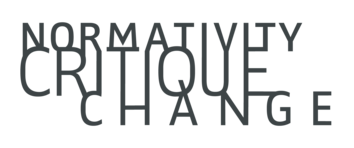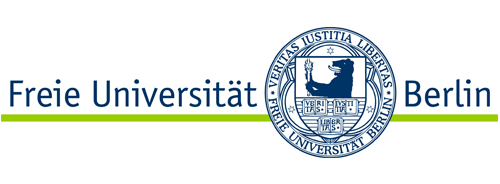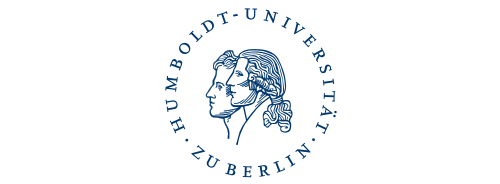Deborah Mühlebach
2021 – present:
Postdoc at the GRK “Normativity, Critique, and Change,” Institute of Philosophy, Free University Berlin
Mentor to 15 PhD students from 10 different fields in the Humanities
2020 – 2021:
SNSF (Swiss National Science Foundation) Visiting Postdoc, Philosophy Department, Free University Berlin
2020:
External Lecturer, Institute of Philosophy, University of Bern, and Department of Gender Studies, University of Zurich, CH
2019 – 2020:
Graduate Research Assistant at the Chair of Theoretical Philosophy (Prof. Markus Wild), University of Basel, CH
2014 – 2019:
Doctoral Degree in Philosophy, University of Basel, CH
Doctoral Committee: Prof. Markus Wild (Basel, CH), Prof. Sally Haslanger (MIT, USA), Prof. Jennifer Saul (Sheffield, UK/Waterloo, Canada)
Title of PhD thesis: “The Politics of Meaning – A Non-Ideal Approach to Verbal Derogation,” Cumulative dissertation consisting of 7 independent but related papers
2017:
Visiting PhD Student University of Sheffield, UK, working with Prof. Jennifer Saul
2016 – 2017:
Visiting PhD Student MIT, Cambridge (MA), USA, working with Prof. Sally Haslanger
2011 – 2014:
Master of Arts in Philosophy, University of Zurich, CH
Philosophy and Gender Studies
2006 – 2011:
Bachelor of Arts in Philosophy, University of Zurich, CH
Philosophy, Sociology, Arabic
CRITICAL AGENCY – An Ethnographically Informed Political Epistemology of Critique
The world is full of critique – some criticise Europe’s anti-migration policies, others criticise Sea-Watch for rescuing migrants at sea, feminists criticise femicides as a structural problem of patriarchy, “anti-woke” movements criticise wokeness, and American footballer Colin Kaepernick takes a knee during the national anthem, a critical gesture for which he was vehemently criticised. But critique does not always land as critique. Some critics are systematically ignored, some talk past each other, and sometimes people have limited access to the resources needed to develop a critical stance. In such cases, critical agency, i.e. the capacity to form and put forward critique that is actually taken up as critique, is limited.
This project explores the nature of critical agency: what does critical agency consist in and what circumstances do promote or inhibit it? CRITICAL AGENCY argues that key to critical agency is the ability to understand a variety of interacting elements on the part of the critic, the addressees and bystanders. Among these elements are the object and content of critique, the social positions of people involved in a critical encounter, and the ways these positions relate to each other. Building on that basic claim, the project aims to develop a political epistemology of critical agency that systematically studies the interaction between socio-political and epistemological aspects of critical agency. It thereby offers new insights into the nature of critique and its social and political relevance by bringing into conversation fields in theoretical and practical philosophy that have hitherto not engaged as much with each other.
Social philosophy has a long history of studying social critique and the relationship between critique, the critic, and the object of critique. However, it has little to say about the interactional nature of critical encounters. But critique that matters is always lived critique that does not stay in the head or exists merely in the realm of reasons. It is socially embedded, communicated, and taken up by others. The subjects of such critique are critical agents – embodied, socially situated, and critically acting subjects. Moving away from the notions of critique and the critic to those of critical agency and the critical agent, this project shifts our attention from macro level explanations to concrete complex social settings in which critique is happening.
This amounts to a more fundamental theoretical shift. By examining how social, political, and epistemological aspects of critique come together in practically lived critique, CRITICAL AGENCY sets out to explain how interactional aspects of critical agency and our understanding of them, do not only shape the communicative form but also the content of critique. How, for example, does blatant male ignorance shape the critical agency of a young woman who tries to put forward a well-formed critique of sexism at her workplace? How does it affect the way of communication and content of her critique? Or, how do lacking epistemic resources affect somebody’s capacity to form and put forward critique even if they are being encouraged by others to do so?
Addressing the social complexity of critical encounters requires close attention to social categories and power dynamics involved in such settings and thus engaging in what feminist and critical race scholars call „non-ideal theorising.” Ethnographic tools serve this purpose well. Fieldwork with participant observation and interviews, as well as already existing ethnographic literature, enable us to develop thick descriptions of specific cases in which the dynamics of critical agency are manifest. A central methodological aim of this project is to show that ethnographically informed philosophy as it has recently emerged as a field in political theory offers rich resources for a non-ideal approach in political epistemology.
In these specific times, we need to collectively navigate a climate catastrophe, several wars, and deep political disagreements. Critique is everywhere but understanding almost inexistent, at least so it seems at first sight. A careful philosophical analysis of critique and understanding helps us better see what our critical practices consist in, what we aim and are able to do when we try to criticise another. But philosophy only lives up to this task if it is sufficiently informed by our real-world practices. With its ethnographic sensibility, the political epistemology of CRITICAL AGENCY answers timely conceptual and normative questions that arise from these social settings.
Philosophical Journal Articles (*Peer-Reviewed):
*Mühlebach, D. 2023. ‘A Non-Ideal Approach to Slurs,’ Synthese 202 (97): 125.
*Mühlebach, D. 2023. ‘Meaning in Derogatory Social Practices,’ Theoria 89 (4): 495–515.
*Mühlebach, D. 2022. ‘Non-Ideal Philosophy of Language’ Inquiry, published online: 1–23.
*Mühlebach, D. 2021. ‘Neo-Pragmatist Inferentialism and Derogatory Terms – A Defence,’ Dialectica 75 (3): 1–31..
*Mühlebach, D. 2021. ‘Semantic Contestations and the Meaning of Politically Significant Terms,’ Inquiry 64 (8): 788–817.
*Mühlebach, D. 2020. ‘Reflective Equilibrium as an Ameliorative Framework for Feminist Epistemology,’ Hypatia 31 (4): 874–89.
Baumberger, Ch., G. Hirsch-Hadorn, and D. Mühlebach. 2015. ‘Enhancing Argumentative Skills in Environmental Science Education,’ GAIA – Ecological Perspectives for Science and Society 24 (3): 206–8.
Book Chapters (*Peer-Reviewed):
*Mühlebach, D. and N. Ernst. Forthcoming. ‘Discursive Resistance in a Non-Ideal World’ in Hänel, H. and J. Müller (eds.) The Routledge Handbook of Non-Ideal Theory. London: Routledge.
*Mühlebach, D. 2022. ‘Tackling Verbal Derogation – Linguistic Meaning, Social Meaning, and Constructive Contestation’ in Bordonaba, D., V. Fernández, and J. R. Torices (eds.) The Political Turn in Analytic Philosophy. Berlin: De Gruyter: 175–98.
Public Outreach Publications:
Mühlebach, D. 2022. “Kritisches Navigieren sozialer Milieus als philosophische Praxis,” FirstGenPhilosopher-Blog, Berlin.
Mühlebach, D. and H. Koch. 2022. ‘Stellungnahme zur GAP-Stellungnahme «Für eine freie Auseinandersetzung in den Wissenschaften»,’ Praefaktisch Online.
Cassee, A., A. Goppel and D. Mühlebach. 2021. ‘Sprachkritik,’ Hinterfragt – Ethik Podcast, Bern.
Mühlebach, D. 2021. ‘Opfer sprachlicher Gewalt?,’ Zürich: Neue Wege.
Mühlebach, D. and C. Bratu. 2021. ‘Feministische Philosophie – was, wie, weshalb?,’ Praefaktisch Online.
Mühlebach, D. and V. Schick. 2020. ‘Wie gewaltvoll kann Sprache sein?,’ Gender Campus Online.
Mühlebach, D. 2020. ‘Was ist sinnvolle feministische Sprachkritik?,’ Zürich: Widerspruch.
Mühlebach, D. 2019. ‘Was wäre, wenn es nur ein Geschlecht gäbe?,’ SRF Sternstunde Philosophie Online.
Gloor, A. D. Mühlebach, P. Teuwsen. 2019. ‘Wahrheit zwischen Maulkorb und Selbstzensur,’ Stapferhaus Stunde der Wahrheit. Radio Argovia Online.
Mühlebach, D., V. Kiefer and H. Rust. 2019. ‘Feministisch auf(t)räumen – für emanzipierte Hochschulen,’ Rosarot – Zeitschrift für feministische Anliegen und Geschlechterfragen 57: 54–7.
Bleisch, B., L. Hirn, S. Miller, D. Mühlebach. 2019. ‘Wohin steuert der Feminismus?‘, Sternstunde Philosophie, Zürich:SRF – Schweizer Radio und Fernsehen.
Mühlebach, D. 2017. ‘Is There a Politically Correct Language?,’ Basel: UNI NOVA 130: 64-5.





